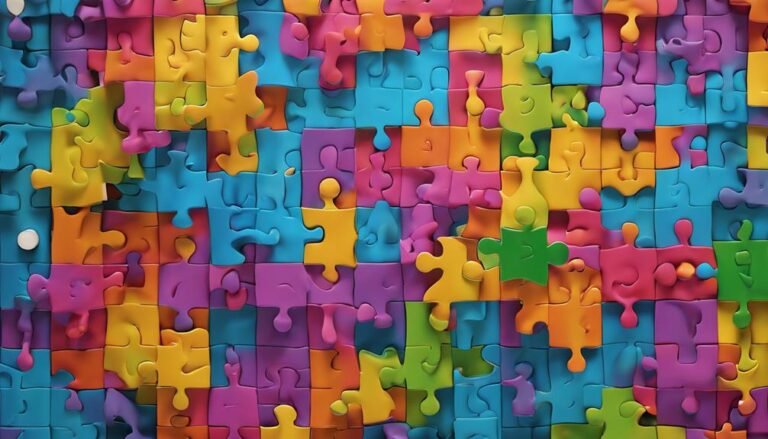Introduction to Personality Development
As you delve into the intricate facets of personality development, you will uncover the complexities of human growth and self-discovery. The journey towards understanding what shapes your character is a voyage filled with intriguing revelations and profound insights. Discovering the interplay between nature and nurture, and how pivotal experiences mold your identity, offers a compelling narrative of personal evolution. Begin this exploration of self-awareness and transformation, where each discovery reveals a new layer of your authentic self waiting to be revealed.
Key Takeaways
- Personality assessment reveals behavior patterns and traits.
- Genetic predispositions and environmental factors influence personality.
- Childhood experiences profoundly impact adult behaviors.
- Self-improvement through introspection leads to a purposeful life.
- Identifying strengths and weaknesses is crucial for personal growth.
Understanding Personality Traits
When delving into the world of understanding personality traits, it's essential to recognize the intricate interplay of various characteristics that shape an individual's behavior and thought patterns.
Personality assessment plays an important role in this exploration, providing insights into one's behavior patterns and tendencies. Through introspection and observation of how you react to different situations, you can gain a better understanding of your personality development.
Self-improvement is often a key motivator for diving into the domain of personality traits. By identifying areas where growth is needed, individuals can initiate a journey towards personal development. Recognizing your strengths and weaknesses allows for targeted efforts towards self-improvement, ultimately leading to a more fulfilling and purposeful life.
Understanding behavior patterns within the context of personality development offers a unique opportunity for growth and transformation. By leveraging this knowledge, individuals can make conscious choices to enhance their strengths and work on areas that require improvement. Embracing the complexities of personality traits is a significant step towards self-awareness and personal growth.
Influence of Genetics on Personality
Understanding your personality traits leads us to explore the influence of genetics on shaping who you're as an individual. The age-old debate of nature versus nurture plays a significant role in understanding personality development.
Genetic predispositions, inherited from your parents, form the foundation of your personality. These predispositions can influence various aspects of your personality, such as your temperament, creativity, and even susceptibility to certain mental health conditions.
Research suggests that genetics can influence traits like introversion or extroversion, openness to new experiences, and resilience to stress. While genetics provide a blueprint for certain aspects of your personality, it's essential to remember that environmental factors also play an important role in shaping who you become.
Your experiences, upbringing, and interactions with the world around you all contribute to the complex tapestry of your personality.
Impact of Environment on Development
The environment you grow up in plays a significant role in shaping your personality and overall development. When considering the age-old debate of nature vs. nurture, it becomes evident that while genetics provide the foundation of who you are, environmental factors are vital in determining how your traits manifest.
Your surroundings, such as family dynamics, socioeconomic status, cultural influences, and educational opportunities, all contribute to shaping your beliefs, values, and behaviors.
Environmental factors can have a profound impact on your development. For instance, growing up in a supportive and nurturing environment can foster confidence and resilience, leading to a more positive self-concept. On the other hand, exposure to adverse conditions like abuse, neglect, or poverty can hinder your emotional and cognitive growth, potentially resulting in long-term challenges.
Understanding the interplay between nature and nurture is essential in comprehending how individuals become who they are. By recognizing the significance of environmental influences, we can appreciate the complexity of personality development and the importance of creating conducive environments for growth and flourishing.
Role of Experiences in Shaping Personality
Experiences, both positive and negative, play a significant role in shaping your personality and influencing your overall development. Childhood memories, in particular, have a profound impact on how you perceive the world and interact with others.
Traumatic events during early years can lead to lasting personality changes, influencing your behaviors and attitudes well into adulthood. For example, a difficult childhood marked by neglect or abuse can result in issues like trust issues, low self-esteem, or difficulties in forming healthy relationships later in life.
On the other hand, positive experiences during childhood, such as love, support, and encouragement, can foster traits like resilience, empathy, and self-confidence. These early experiences lay the foundation for your personality development and can shape your adult behaviors in significant ways.
As you navigate through life, each experience, whether positive or negative, continues to mold and refine aspects of your personality, contributing to your growth and evolution as an individual.
Importance of Emotional Intelligence
Understanding the significance of emotional intelligence is essential for your personal growth and relationships. EQ plays an important role in how you navigate interactions, offering insights into self-awareness and empathy.
EQ in Relationships
Emotional intelligence plays a pivotal role in nurturing healthy and fulfilling relationships. Communication skills are the cornerstone of any successful relationship. By being attuned to your emotions and those of others, you can navigate conversations with empathy and understanding.
Emotional maturity allows you to express yourself honestly while also being receptive to your partner's feelings, fostering open and honest communication.
Conflict resolution is an inevitable part of any relationship, but those high in emotional intelligence approach disagreements with a mindset of finding solutions rather than escalating tensions. By actively listening, showing empathy, and communicating assertively, you can resolve conflicts in a way that strengthens the bond between you and your partner.
Mutual respect is another significant aspect of relationships, and emotional intelligence plays an essential role in cultivating this respect. Understanding and validating each other's emotions create a foundation of trust and appreciation.
Self-Awareness and Empathy
Maintaining healthy relationships requires a deep understanding of your own emotions and the ability to empathize with others, highlighting the importance of developing emotional intelligence in self-awareness and empathy. Self-awareness involves recognizing your feelings, thoughts, and behaviors, leading to a better understanding of how these aspects influence your interactions with others. Through self-reflection exercises, you can uncover underlying emotions, motives, and beliefs, enhancing your emotional intelligence.
Empathy plays an essential role in fostering meaningful connections with others. By putting yourself in someone else's shoes and grasping their perspective, you can respond to their feelings with sensitivity and understanding. Effective communication skills are essential in expressing empathy. Active listening, nonverbal cues, and validating emotions are key components that contribute to building empathy in relationships.
Developing self-awareness and empathy through emotional intelligence not only strengthens your interpersonal relationships but also nurtures personal growth. By engaging in self-reflection exercises and honing your communication skills, you pave the way for more profound connections and a greater sense of emotional fulfillment in your interactions with others.
Managing Emotions Effectively
To effectively manage your emotions, it's important to develop a high level of emotional intelligence that allows you to navigate various situations with self-awareness and empathy. Emotion regulation and stress management are key components of emotional intelligence. By understanding and regulating your emotions effectively, you can respond to challenges in a more essential manner.
Practicing mindfulness can greatly enhance your emotional intelligence. Mindfulness involves being present in the moment without judgment, which can help you better recognize and manage your emotions.
Additionally, improving your communication skills is essential for managing emotions effectively. Being able to express your feelings clearly and listen empathetically to others can prevent misunderstandings and conflicts.
Building Healthy Relationships
Developing strong and meaningful connections with others is essential for fostering positive interactions and personal growth. Communication skills play a pivotal role in building healthy relationships. Effective communication involves active listening, expressing thoughts clearly, and being empathetic towards others' perspectives. By honing your communication skills, you can guarantee that your interactions are constructive and meaningful.
Trust building is another crucial component of healthy relationships. Trust is the foundation on which strong connections are built. It involves being reliable, keeping promises, and maintaining confidentiality. When trust is present in a relationship, individuals feel secure, valued, and understood.
To nurture healthy relationships, it's important to practice open and honest communication while also prioritizing trust. By developing these aspects, you can establish strong connections that contribute to personal growth and overall well-being.
Remember that building healthy relationships is a continuous process that requires effort, understanding, and a genuine desire to connect with others.
Strategies for Personal Growth
As you start on your journey of personal growth, establishing clear goals and reflecting on your experiences are essential strategies to help you evolve.
Goal setting provides direction and motivation, while self-reflection allows you to gain insight into your thoughts, emotions, and behaviors.
Goal Setting Strategies
When starting on your journey of personal growth, utilizing effective goal-setting strategies is essential for progress and development.
Action planning is a vital component of goal setting. Break down your larger goals into smaller, manageable tasks that you can work on consistently. This helps prevent feeling overwhelmed and enhances your focus on specific actions needed for growth. By setting clear, achievable objectives, you create a roadmap for your development.
Progress tracking is equally important. Regularly monitor your advancements towards your goals. This allows you to celebrate your successes, identify areas for improvement, and make necessary adjustments to your action plan. Tracking progress provides motivation and helps you stay committed to your personal growth journey.
Self-Reflection Techniques
Effective self-reflection techniques serve as powerful tools for fostering personal growth and self-awareness. Engaging in mindfulness practices allows you to be fully present in the moment, enhancing your ability to understand your thoughts and emotions.
Journaling exercises provide a structured way to express your feelings, reflect on past experiences, and set goals for the future. By incorporating meditation techniques into your routine, you can cultivate a sense of inner peace and clarity, enabling deeper self-discovery.
Introspection activities prompt you to explore your values, beliefs, and motivations, leading to a better understanding of yourself and your interactions with the world around you. Taking time for self-reflection allows you to identify areas for improvement, celebrate your successes, and make necessary adjustments to align with your personal growth objectives.
Conclusion
So, you've learned about the intricacies of personality development, the interplay of genetics, environment, and experiences in shaping who you are. Now, armed with this knowledge, you can navigate the complexities of your own psyche with ease, right?
Wrong. Remember, understanding is just the first step. True growth requires continuous effort, introspection, and a willingness to embrace change.
Good luck on your never-ending journey of self-discovery!







